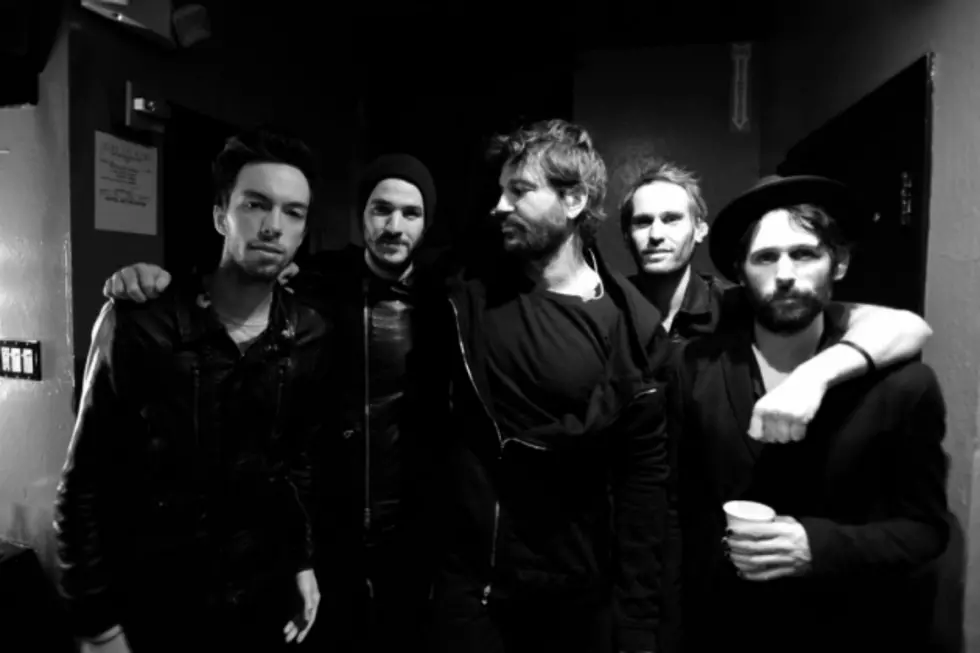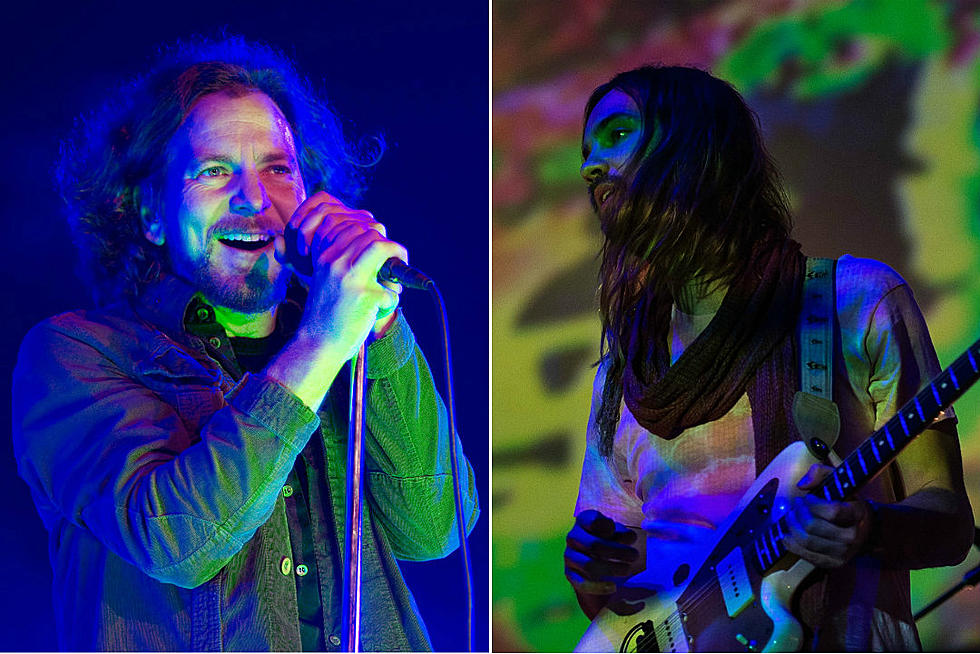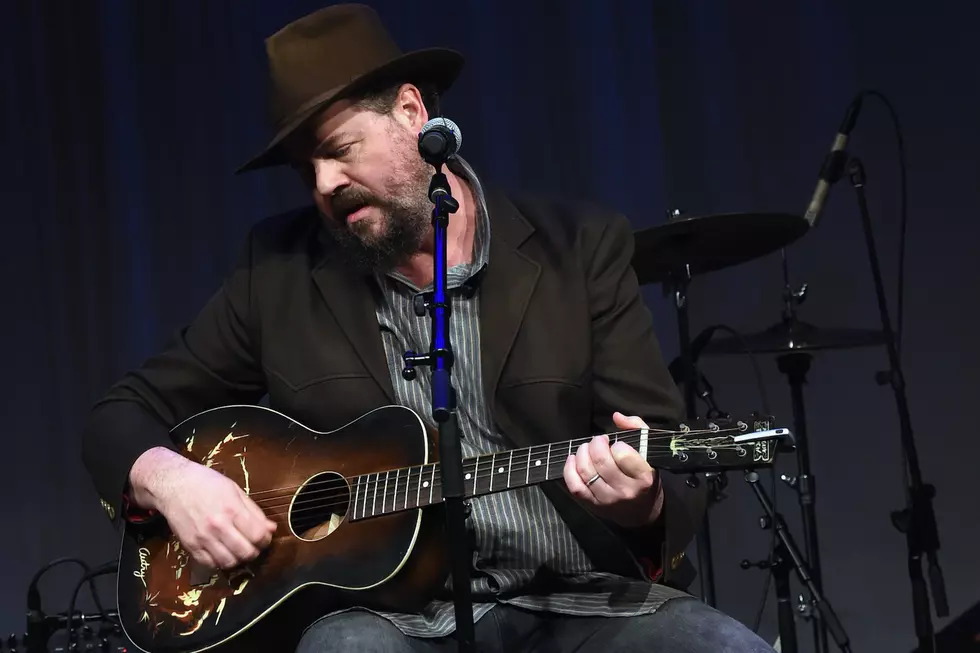
Third Eye Blind’s Brad Hargreaves on ‘Dopamine’ + Why It May Be Their Last Album
Earlier this month, Third Eye Blind returned with their fifth album, Dopamine – their first since they released Ursa Major in 2009. It's been nearly 20 years since the arrival of their self-titled debut and ‘90s radio staples like “Semi-Charmed Life” and “How’s It Going to Be,” the Stephan Jenkins-led crew promised their latest effort would boast a “vintage Third Eye Blind” sound.
While the pleasant familiarity of Dopamine and an ongoing tour with Dashboard Confessional may seem like an unequivocal appeal to not only loyal Third Eye Blind fans but a wider set of listeners interested in indulging the pangs of nostalgia, the California rockers also said their latest full-length would embody “the rapidly changing world we live in.”
That appears to be a sentiment Third Eye Blind are preaching but also putting into practice. Jenkins recently told Huffington Post Live that Dopamine may very well be the band’s final full-length album. In lieu of the traditional format, the band will instead opt to release singles digitally -- a decision that lends itself to the band’s creative process as well as today's fragmented consumption of music and the fleeting attention spans of modern listeners.
We spoke to drummer Brad Hargreaves (pictured far left) on the day of Dopamine’s release, and he talked about the making of the new album and why the digital era suits the band so well.
It’s been about six years since you released your last album, Ursa Major. Why the long break between albums?
We put out a record in 2009 and we toured on that for a couple years, so that was a couple years we weren’t really working on it. Then we just casually started getting back together. Stephan started writing some songs and then we started getting together and diving into them. A big part of the reason it takes a long time is because we’ve been lucky enough to have a successful career and there are a lot of opportunities that we have as people that are away from music as well, and we do a lot of those things. So if you were to add up all the days we worked on the record, it probably would’ve taken about a year to make the record, but we don’t really work on it that way. We work a couple of days this month and a couple days next month and, next thing you know, it’s six years.
How did the recording process this time around compare to previous albums?
We don’t really have a process. We look at the song we have and go, “Okay, it’s ready to go. Let’s book the studio.” [For] some of them, we’ll bring in this session from the demo we did for it, maybe use a couple parts from that, build a song and then overdub a song. Sometimes we get in there with the whole band and just cut it live. We’ll cut it live, do overdubs and then we’ll chop it up later. I mean, there’s no real process. We just kind of gauge [whether we] are conveying the emotion of the song and the lyrics. We try to figure out the best way to arrive at delivering that emotion.
How do you collaborate during the songwriting process?
Sometimes Stephan brings in completed songs. “Get Me Out of Here” was a song he had written all the parts [for], and then he and I got in a room and worked on the little connecting phrases. Like, how do we get out of the chorus to the next verse and what’s that little transition? Sometimes he’ll just have a verse and a chorus and then we’ll get together in a room and write a bridge. Sometimes he’ll have a whole song, and then we’ll completely rework it and go, “Okay, this song’s cool this way, but what if we just completely reimagine it?” That’s like “Back to Zero," it was a completed song. He had the chords, the melody and the lyrics, and then we just kind of tore it apart and turned it into a really different-sounding song and I think it made it better.
Your back catalog is really instantly recognizable and loved by so many. Does that make it difficult to tackle new material and keep things fresh?
You know, I don’t think about any of the old material. I mean, I think about the old material in terms of I want to make sure that we’re evolving musically and sonically and I don’t want to tread over what we’ve done. You can get a little comfortable in terms of the sounds you use and where you go with songs. I think Ursa Major, to me, was that album where we were a little bit comfortable using the tried and true [methods]. [We] definitely wanted to make sure we’re evolving, but in terms of the actual writing, I don’t really think of the old records. It’s all about what’s this new song? How does it make me feel and how do I contribute to making the feeling I have when I hear it conveyed on the recording?
Stephan recently said that he thought this album might be your guys’ last in terms of the traditional format. Instead, he wants to individually release songs digitally. Is that something you guys are all on board with?
Yeah, absolutely. I mean, we -- Stephan in particular -- struggle with putting 12 songs together in an appropriate time frame for album-making, but certain songs pop right out and they come out really easily. I think the way people digest music digitally now, it just makes so much sense to -- when you’re inspired and you’re finished with the song -- record it and put it out. There’s much more immediacy to that than waiting, like, “Okay, we’ve got a great song, now I have to wait until we write 10 more so people can hear it.” It doesn’t even make sense to do it like that.
So, it sounds like you’re just looking to adapt to how the music industry has changed?
It’s not even adapting so much. The way that the industry has evolved has sort of allowed it to work better for us. We don’t want to have to write 12 songs to put out a record. We just want to be able to put them out when they come. The way that social media and the internet have worked, we see it as something that’s in our favor and much more in line with our sensibilities of how we want to put out music.
Stephan did make a comment that music is “presumed to be free.” Do you share his views on that?
It definitely is, I mean there’s no question. People steal music, and I’m sure there are a lot of people that will get this album and will have never paid for it. To be honest, on the one hand, yes, it’s unfortunate that no value is attached to it, but on the other hand, I just want people to have this record. We made it for people to listen to. If they want to steal it, I’m like, “Go steal it.” I think the bigger tragedy is when I look at something like Spotify. It’s a wonderful service for consumers, but any business that’s built so the product you sell is basically free; that’s a great business for consumers and that’s great for the business owner, but it’s not great for the people who make the product. At the same time, it allows us to be on people’s playlists and get in people’s faces that we might not otherwise. It’s a give and take. Sometimes it’s a little distressing and other times, well; thank God it’s like that.
[Jenkins] also said that, in the midst of a changing industry, the bright spot for you guys is the strong live rapport you have with your fans at concerts. Is that a difficult relationship to achieve and maintain in the current landscape?
It hasn’t been difficult for us, but with that being said, we take every live performance very seriously. Each time we play, we want people to walk away thinking, “This is great.” It doesn’t always work; we’ll have a bad night here and there, but Stephan and I, since the beginning, have always taken so much pride in our live performances. And he’s a great frontman. Some nights I’m not feeling that good, and he’s up there looking people in the eyes and really delivering a compelling rock show. I don’t tell him that [laughs], but I’m really appreciative of that. I think if you’re a new band and you’re not going to get paid for your record and you’re going to have a hard time developing a live following, then yes, I really feel for those artists coming up. I would be saying the same thing that they’re saying if we didn’t have a really strong live following. But that’s how we do it – we go work for our supper.
You recently released a cover of Beyonce’s “Mine.” How did that come about?
That was just a song that Stephan really gravitated toward. We were into the thick of making Dopamine and I think someone played him that record and he really got into it. He loved the way that she just threw it out there with no promotion. It’s a really experimental pop record, a lot of the production on that. I think that was really freeing for him to see at the time and he just kind of gravitated to that song, those lyrics and really just made it his own. In fact, the first time he played it for me, I literally thought it was a song that he wrote and I was like, “That is an amazing song.” Of course, I think his vocal performance on that is right up there as the very best of anything he’s ever sung.
You’re on tour with Dashboard Confessional. What can fans expect from that?
It’s just a big, glorious rock show. Dashboard goes on around 8PM every night, so it’s dusk and they have that beautiful backdrop. We’re lucky, because by the time we go on, it’s dark and the lights come up and we can really deliver our full, anthemic show. It’s something we’ve developed over a long period of time, but each tour is a little bit different. We choose a different place, different songs and obviously we have a new record, so we’re playing new songs from that. But the end goal is always to create that feeling -- at some point, hopefully earlier in the set rather than later -- where everybody’s singing and everyone feels part of something. When it’s really working, it’s an overwhelming, oceanic feeling of oneness and togetherness. That’s what we really strive to achieve.
Do you find it difficult planning your shows and balancing fans’ expectations of hearing your old material with your own expectations of what you want play?
Yeah, that’s always the difficult part of it. That’s just a line we play with constantly and sometimes we step over the line in a good way. Sometimes we play too many old songs and sometimes we play too many new songs. The set list is secondary to the whole idea of the way we play concerts in that each song, regardless of what record it’s on, serves a purpose at that moment, whether it’s building the energy, releasing the energy or kind of plateauing the energy. The way we structure our set list is to control the emotion of the room, so over the course of the concert, you’ve experienced a real ebb and flow emotionally and hopefully it builds up to a pretty good crescendo at the end.
More From Diffuser.fm









